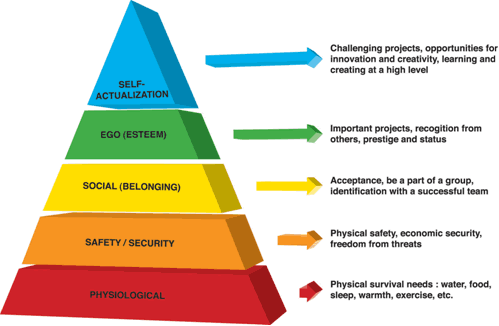| The Medium
of Money
by David Rippe and Jared Rosen
Coauthors of The Flip—Turn Your World Around
www.theflip.net
Money in and of itself is neither a good nor a bad
thing. It is simply a medium for facilitating the
exchange of goods and services. How we use money to
fulfill our needs, wants and desires determines whether
we have a healthy or detrimental relationship to money.
In terms of Maslow’s widely accepted Hierarchy
of Need seen below, money can satisfy our physiological
needs: food, water, clothing, shelter. It can serve
some of our safety and social needs as well. Wealth
can even help us achieve success in the upper ranges
of Maslow’s pyramid. A normal human being in
a Right Side Up world would first satisfy one’s
needs at the physiological level, then graduate to
covering the need for safety and security, and moving
to ever higher levels as the needs are met.

In the upside-down world, these human needs are preyed
upon and turned upside down, perverting our natural
value system. The pursuit of wealth becomes a substitute
for our actual needs. This distortion of “what
really matters” is driven and reinforced by
the economic powerhouses of marketing, advertising,
and public relations. Examples of skewed values include:
the pricing of fashionable gym shoes at $150 after
they have been produced in foreign sweatshops, under
horrid conditions, for $2; athletes making more in
one year than teachers, fireman and police officers
do in a lifetime; tickets to the theatre that cost
more than it would to feed 100 of the hungry and homeless.
How we spend our money does matter.
Fortunately, a major financial flip is in full bloom.
Examples of the flip taking place around the world
are abundant. The growing Fair Trade movement (see
www.globalexchange.org
or www.transfairusa.org)
links consumers who want to purchase products such
as coffee, tea, chocolate, rice, and bananas to companies
who pay their workers a living wage, promote health
and safety, and adhere to sound environmental and
conservation principles.
There is a long and growing list of companies which
manufacture, distribute, and sell eco-friendly fabrics
and clothing. These organic clothes are soft, comfortable,
strong, and grown without toxins from pesticides.
One excellent source of information for all aspects
of the money flip is Co-op America (www.coopamerica.org),
which functions as a clearinghouse for all things
green. This site is a wealth of information and resources
from organic products to cosmetics to socially responsible
mutual funds.
Looking for somewhere to invest for retirement that
has you and the best interest of the planet in mind?
Socially responsible investing (SRI) is a rapidly
growing industry that allows the investor to integrate
personal values and societal concerns with investment
decisions. Besides individuals, social investors include
corporations, universities, hospitals, foundations,
insurance companies, pension funds, nonprofit organizations,
churches and synagogues.
Socially responsible investment funds typically incorporate
three key elements: screening, shareholder advocacy,
and community investment. There are hundreds of socially
responsible funds available. The Social Investment
Forum (www.socialinvest.org)
offers detailed data, portfolio make-up, and performance
of each fund. This is a great way to put your money
where your heart is. Many of these funds regularly
outperform traditional mutual funds.
Here are a few other resources you can tap. While
we aren’t making specific recommendations, investigating
these sources of socially responsible investing will
certainly put you—and the earth—on a more
harmonious path.
There are a number of community-centered banks and credit
unions that believe in personal service investing in
local communities. You can visit the Credit Union National
Association (www.cuna.org) for a review of the benefits
and list of local credit unions.
Jared Rosen and David Rippe are coauthors of The
Flip—Turn Your World Around, Hampton Roads Publishing
Company. They can be reached at www.theflip.net
or 513-253-4854.
|